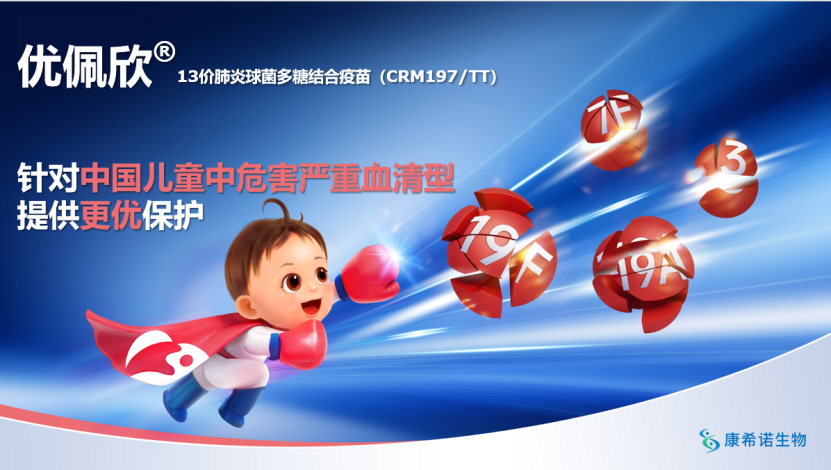Tianjin, 20 June 2025 - CanSino Biologics Inc (“CanSinoBIO” or “the Company”) is pleased to announce that its independently developed 13-Valent pneumococcal polysaccharide conjugate vaccine (CRM197/TT) (the “PCV13i”), trade name iPneucia®, has obtained NDA approval from National Medical Products Administration (NMPA) of China.
iPneucia® is the first pneumococcal polysaccharide conjugate vaccine in China to adopt CRM197 and tetanus toxoid (TT) as carrier proteins, which improve immune response and effectively avoid adverse reactions due to excessive use of a single carrier.

Pneumonia is one of the most serious public health problem worldwide. According to the World Health Organization (WHO), this acute respiratory infectious diseases caused more than 1.6 million death cases every year, which become a leading cause of death among young children and the elderly globally1. The disease, often cause by Streptococcus pneumonia, can lead to severe complications such as sepsis and meningitis if left untreated.
In China, approximately 550 thousand cases of pneumococcal pneumonia occur in children under 5 years old annually2. Severe pneumococcal pneumonia accounts for 93% of all severe pneumonia cases3. One of the ideal strategies for developing new vaccines is to enhance the effectiveness against the serotypes with the heavy disease burden4.
iPneucia® adopts a dual-carrier conjugate technology. This design not only reduce side effects from relying on single carrier, but also helps avoid interference when given with other vaccines5. Notably, the vaccine offers stronger protection against 4 key serotypes —— 19F, 19A, 7F, and 3 —— which cause the most serious pneumococcal infections among children in China*.
As a innovative vaccine, iPneucia® use a covalent combination of polysaccharide antigens and carrier proteins. After the polysaccharide antigens are linked to the carrier proteins, the polysaccharide can be converted into T cells dependent antigens, which not only induces a high level of specific antibodies in infants and young children under 2 years old, but also generates memory B cells to produce immune memory6.
CanSinoBIO has adopted a safer production process, with animal-free culture medium as the fermentation medium. This process reduces risks from animal-derived biologicals factors and avoids the toxicity residue from traditional purification process by phenol method, helping preserve vaccine quality and immunogenicity7.

The approval of iPneucia® represents a major milestone for CanSinoBIO, reflecting over a decade of commitment and innovation in the field of vaccine research and development. This breakthrough not only enriches the company’s product pipeline, but also provides a innovative, high-quality and affordable solution in China.
CanSinoBIO is dedicated to developing innovative, high-quality and affordable solutions to combat infectious diseases and to addressing unmet medical needs around the world.
Note:
References:
1.WHO. Meeting of the Immunization strategic Advisory Group of Experts, November2007一一conclusionsand recommendations [J]. weekly Epidemiology Record, 2008,83(1): 1一15.
2.卫生策略研究简报,肺炎链球菌结合疫苗接种的现况、挑战及建议. https://mp.weixin.qq.com/s/KJi7KN-S-8aAI9I8OyUerg
3.Lai X, Wahl B, Yu W, et al. National, regional, and provincial disease burden attributed to Streptococcus pneumoniae and Haemophilus influenzae type b in children in China: Modelled estimates for 2010-17. Lancet Reg Health West Pac. 2022 Mar 16;22:100430.
4.Fu J, Yi R, Jiang Y,et al. Serotype distribution and antimicrobial resistance of Streptococcus pneumoniae causing invasive diseases in China: a meta-analysis. BMC Pediatr. 2019 Nov 11;19(1):424.
5.Ladhani SN, Andrews NJ, Waight P, et al. Interchangeability of meningococcal group C conjugate vaccines with different carrier proteins in the United Kingdom infant immunisation schedule. Vaccine 2015; 33:648-55; PMID:25510388; http://dx.doi.org/10.1016/j.vaccine.2014.12.018.
6.中华预防医学会, 中华预防医学会疫苗与免疫分会. 肺炎球菌性疾病免疫预防专家共识(2020版) [J] . 中华预防医学杂志,2020,54 (12): 1315-1363.
7.王志军.疫苗的质量控制与评价. 人民卫生出版社. P195